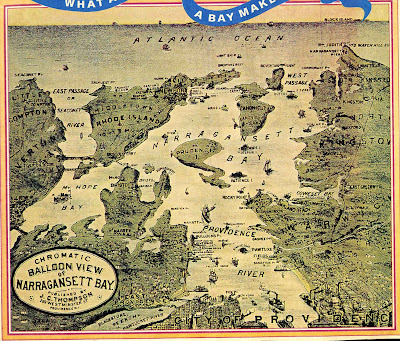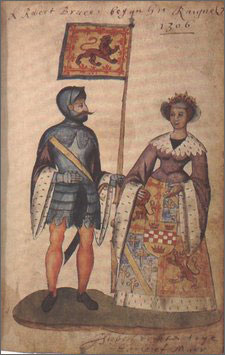I will tell you, Neal Dow was the worst type of politician - a true believer. If you travel long enough down any philosophical path you always reach the land of ad nausea. But the true believer will never admit that such a place exists in their philosophy. So having reached ad nausea this spiritual Puritan in Quaker garb, this five foot two inch tall Napoleon of Temperance, this two term Mayor of Portland, Maine, Neal S. Dow, could never find his way back to sanity. Even the Rum Riot of 1855 failed to convince Mayor Dow that his own blindness had set the cause of sobriety in America back by a generation.
The first time Neal Dow (above) was elected Mayor was in April of 1851. He had been carried into office on his support of the new “Maine Law”, which made the sale of alcohol in the state illegal, except for medicinal and industrial uses. Wrote Neal, “Portland wharves groaned beneath the burden of West India rum.” Eighteen other states quickly followed Maine's moralistic lead. But as in all the other states, the new law was popular in Calvinist Maine only so long as it was easily avoided.
The most famous bootlegger became “Handsome Jim” James McGlinchy, who along with his three brothers, operated the Casco Brewery, after the original name for Portland. It and a few distilleries survived the Maine Law because, officially, they exported all of their product. But a good part of all that rum seeped back into Maine. Such leaks in his prohibition boat infuriated Mayor Dow, who was also president of the Temperance League. And after raiding every Irish “grog shop” in Portland failed to plug the local traffic in the demon rum, the Mayor insisted on searching all trains, boats and wagons entering the city. Since Portland was the primary rail and sea connection with Canada, the delays this created infuriated merchants up and down the eastern seaboard. Dow was even burned in effigy on Boston Common. And in April of 1852, when Mayor Dow came up for re-election, merchants from all over New England funded his opponent, Albion K. Parris. Mayor Dow lost re-election by 542 votes out of 3,300 cast.
Being a true believer (his maternal great-grandfather had the given name of “Hate-Evil”), the diminutive Mr. Dow could not believe the fault was his or his cause's . He was convinced he had been victimized by a conspiracy of merchants who provided fake I. D.s for the 2,200 Irish immigrants in Portland who had brought to America their strange religion and their vulgar sinful ways. Even worse, they almost all voted Democratic. Still at least the new Mayor Parris was also a temperance man, if not quite as enthusiastic an enforcer of the law. So“The Grand Pooh-bah of temperance” as the Irish nick-named him, retreated to his house at 714 Congress Street, to lick his wounds, and plan his comeback.
Under the theory that the only problem with his temperance law was that it was too weak, in 1853 Dow lobbied the state legislature in Augusta to doubled down. The new sterner temperance law they passed allowed a search warrant to be issued if three private citizens claimed liquor was present in an establishment. It also made the mere possession of alcohol proof of intention to sell. Thus ever user was now a dealer. By now Dow was convinced the temperance movement was so strong...“The voters...will turn upon that point.” The little dictator even saw the growth of the Republican Party across the northern states not as primarily a condemnation of slavery, but as a rejection of alcohol.
In March of 1855 Maine passed two other pieces of legislation which Dow had come to see as essential for the eradication of liquor. First all immigrants must register and show their naturalization papers three months prior to election day. This disenfranchised hundreds of qualified voters for the approaching April elections, under the theory that what a local newspaper described as “Irish cattle” were also “illegals” with false papers. The second law took care of most of the rest of Irish voter-wanna-be Americans. From now on, any voter rejected at the polls for whatever reason in Republican Maine, must appeal in Federal court. Cases here could take weeks just to get on the docket. The Democratic paper, the Eastern Argus put it best. “Dow...and company...have made up their minds to rule the state at all hazards.”
And they did. Dow was re-elected Mayor in April of 1855. But out of the 3,742 votes cast, Neal Dow's margin of victory was a mere 46 votes. Ignoring that slim margin his close friend and political ally, Elder Peck, said it was “...a victory over Rum…Catholicism, and Corruption.” In his inaugural address, the zealot Mayor Dow warned, “I shall not fail... to employ all the power which the law has put into my hands.” He even suggested that his administration would “restrain the right of suffrage, now exercised by our foreign population...to prevent their overawing and controlling our elections, as they have done.” Mayor Dow had thrown down the gauntlet. And it would slap him right across the mouth.
As part of his new duties, Mayor Dow and the city council were supposed to jointly appoint a committee to pick a new liquor agent, whose job it would be to purchase liquor which would then be legally sold to the apothecaries and industries of the city. However Mayor Dow was so certain of his own nobility, he appointed himself to the selection committee, and to save even more time appointed himself the temporary liquor agent. As such he purchased $1,500 of booze (in his own name) and had it shipped to City Hall. Only after it arrived did he notify the city council. After all, who could question the morals of Mayor Dow?
The answer was the city council could. Their council members got into a shouting match with the Mayor over his actions. And one of them leaked details of the shipment to the Eastern Argus. On Saturday June 2, 1855 the paper printed up and posted handbills all over Portland, which laid out the facts, in particular that the liquor had been bought under the name of Neal Dow. The handbills then asked, “Where are our vigilant police... who think it their duty to...often push their search (of the poor man's cider) into private houses, contrary to every principle of just law? We call upon them by virtue of Neal Dow’s law to seize Neal Dow’s liquors and pour them into the street....Let the lash which Neal Dow has prepared for other backs be applied to his own when he deserves it.”
The timing could not have been worse for Mayor Dow. This was the four year anniversary of the original Maine Law. Three men found a judge who witnessed their testimony that there was illegal alcohol in City Hall, and he was thus required to issue a search warrant. A small crowd gathered at City Hall, mostly to see if the police were going to arrest Mayor Dow. They were not. But still the crowd stayed. And as the day wore on, and the shifts at the locomotive plant and other factories let out, the crowd began to grow. By seven that evening there were 2,500 people milling around City Hall, their anger fueled by what they saw as the hypocrisy of the biggest temperance man in the state having his own $1,500 stash of booze protected by the police. To avoid antagonizing the crowd the ten police officers locked themselves in the Liquor Room in City Hall, with the booze. Mayor Dow sent word to two “private” militia companies to come quick.
At least one member of the militia sensed the approaching disaster. But when Sargent William Winslip suggested the militia should load blanks, Mayor Dow responded, “We know what we are about sir. We’ve consulted the law, sir.” At that point Sargent Winslip dropped out of the militia. At ten that night one company of about twenty men, formed up in front of City Hall. Backed by armed troops, Mayor Dow ordered the crowd to disperse. The crowd responded with a hail of trash and garbage. Dow now ordered the troops to fire over the heads of the crowd. But their commander, Captain Green, said he needed more men. And for the only time that day Mayor Dow let a cooler head over-rule him.
It was a mistake. The sight of the twenty militia men retreating encouraged the crowd to surge forward. Rocks and bricks now replaced the garbage. One energetic fellow, a 22 year old sailor from Deer Isle named John Robbins, crawled through a broken window into the liquor room, unlocked the door, and the crowd stormed in. At this moment the reinforced militia returned, and under Dow's command, opened fire. The uneven battle continued for twenty minutes. Only the fact the militia were armed with flintlock muskets prevented the death toll from being higher. Robbins was killed, and seven others wounded. Eventually the crowd dispersed. To Republicans it was the Rum Riot. To Democrats it was the Portland Massacre.
Dow was charged with breaking the law he had helped pass, but he was acquitted after a one day trial for two reasons – first it was obvious the liquor was not really his, and second because the judge, Henry Carter, was a strong temperance man and a Dow supporter. Still, Mayor Dow learned nothing from the debacle. He immediately issued a “...Message on the Riot” which he blamed on un-named anti-temperance men, and claimed John Robbins was an Irish immigrant who was wanted by the law. But that charge fell apart when several witnesses under oath testified that John was a native American (i.e. born in America), had never been arrested, was a mate on the barque Louisa Eaton and was a “steady, honest man, remarkable for his good nature and peaceable disposition.” But whatever Robbins' disposition had been, it was suddenly clear the mob had been outraged at Mayor Dow's behavior and had not even been mostly Irish.
That fall the voters drove that point home by electing Democratic majorities to both houses of the state legislature, and the Governor's office, too. And quickly the Maine Law was overturned, ending Maine's five year experiment with prohibition. John Robbins was buried in the old Eastern Cemetery, with honors. Mayor Dow did not bother to even run for re-election. And even though prohibition was re-instated two years later, Neal Dow stayed out of that fight.
The new prohibition law was again rarely enforced. Thus it stayed on the books until the Federal government passed its own “noble experiment” in 1920. By then the bootlegger James McGlinchy had died, in 1880. He left behind an estate worth $200,000, marking him as one of the richest men in Portland. As for the true believer Neal Dow, he was lucky not to live long enough to have seen his dream produce what he feared most, the funding of organized crime, largely made up of foreigners, and an increase in public drunkenness and alcohol addiction. The Napoleon of Temperance died still blind to the truth in 1897 at the age of 93.
And if there is a lesson from the life of Neal Dow, it is that ad nausea is the land where all ideas end up. Or, to put it another way, life is not about perfection, its about balance - it's about leaning into the wind, and staying upright as long as you can. Everybody falls off at least once, in the end. And the lucky ones do it a couple of times. Because they learn from every failure, and they keep getting back on the wire.
- 30 -















































































